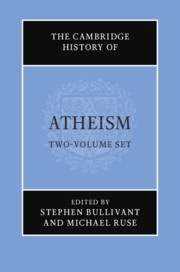Book contents
- The Cambridge History of Atheism
- The Cambridge History of Atheism
- Copyright page
- Dedication
- Contents
- Acknowledgments
- Contributors
- Introduction
- Part I Preliminaries
- Part II Atheisms in History
- Part III Reformation, Renaissance, Enlightenment
- Part IV Classical Modernity: Philosophical and Scientific Currents
- Part V Classical Modernity: Social and Political Currents
- 23 The French Revolution
- 24 Freethinkers, Atheists, and Anticlericals: Spanish American Struggles for Independence
- 25 Marx and Marxisms
- 26 Nineteenth-Century Russia
- 27 Secularism and Humanism
- 28 Bertrand Russell
- 29 Robert Ingersoll
- 30 Early Women’s Movement
- 31 Early African American Secularism
- Part VI Twentieth and Twenty-First Centuries: Intellectual and Artistic Currents
- Part VII Lived Atheism in the Twentieth- and Twenty-First Centuries: Case-Studies
- Part VIII Emerging Atheisms in the Twenty-First Century
- Part IX Conclusion
- Index
- References
27 - Secularism and Humanism
from Part V - Classical Modernity: Social and Political Currents
Published online by Cambridge University Press: 25 September 2021
- The Cambridge History of Atheism
- The Cambridge History of Atheism
- Copyright page
- Dedication
- Contents
- Acknowledgments
- Contributors
- Introduction
- Part I Preliminaries
- Part II Atheisms in History
- Part III Reformation, Renaissance, Enlightenment
- Part IV Classical Modernity: Philosophical and Scientific Currents
- Part V Classical Modernity: Social and Political Currents
- 23 The French Revolution
- 24 Freethinkers, Atheists, and Anticlericals: Spanish American Struggles for Independence
- 25 Marx and Marxisms
- 26 Nineteenth-Century Russia
- 27 Secularism and Humanism
- 28 Bertrand Russell
- 29 Robert Ingersoll
- 30 Early Women’s Movement
- 31 Early African American Secularism
- Part VI Twentieth and Twenty-First Centuries: Intellectual and Artistic Currents
- Part VII Lived Atheism in the Twentieth- and Twenty-First Centuries: Case-Studies
- Part VIII Emerging Atheisms in the Twenty-First Century
- Part IX Conclusion
- Index
- References
Summary
The nineteenth century is the first century in which definitions circumvented the globe, promoting discussion of their helpfulness in describing the universe that humankind found itself within. This impetus is especially exemplified by the growth of unbelief into a movement in the nineteenth century. From its inception right through to its mutation in the twentieth century it would, throughout, be obsessed with such words and labels. Oftentimes these were attempts to escape from the unhelpfulness of a previous label as much as to forge something innovative and helpful with a new one.
- Type
- Chapter
- Information
- The Cambridge History of Atheism , pp. 500 - 511Publisher: Cambridge University PressPrint publication year: 2021

